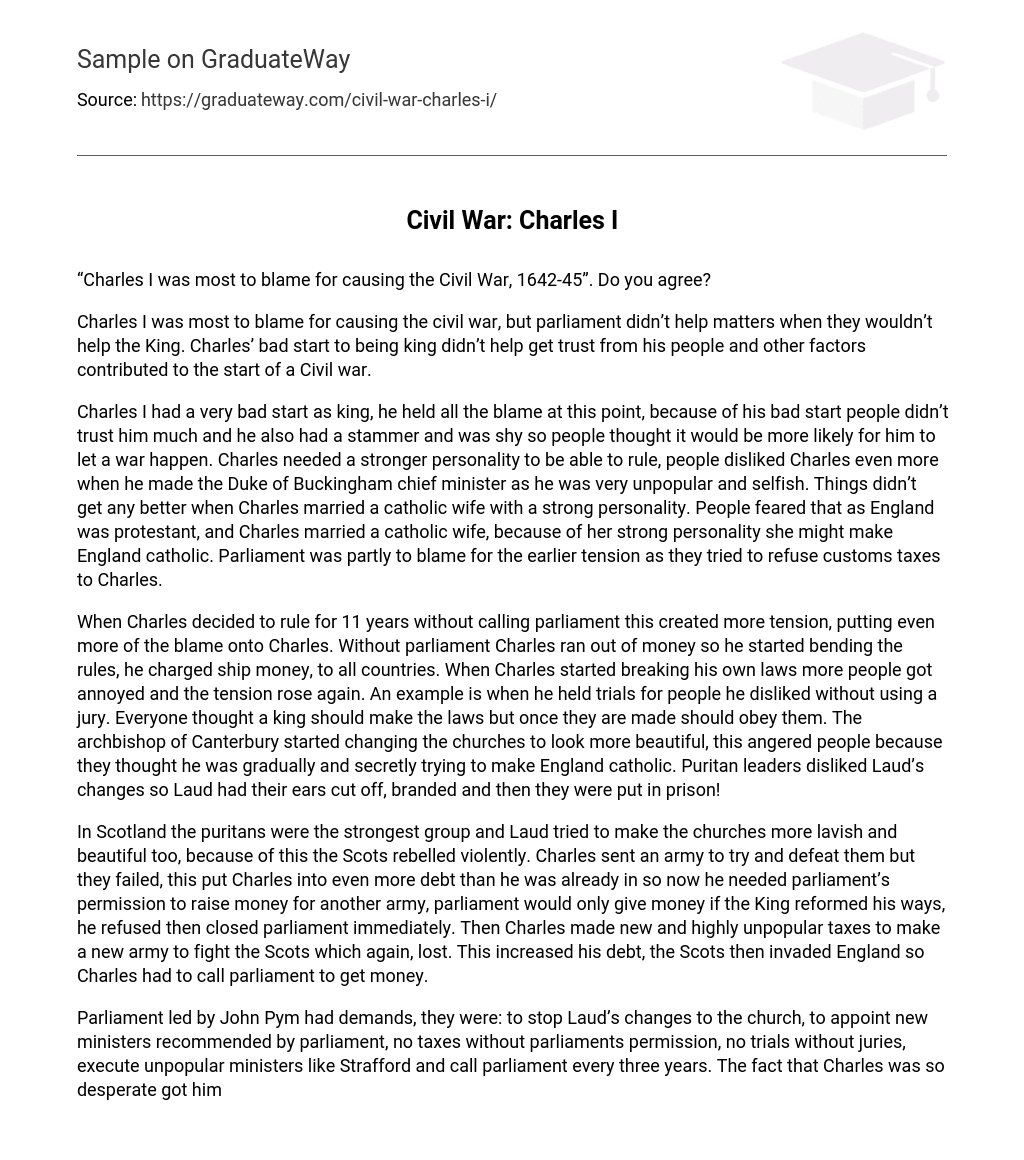Do you agree that Charles I was mostly to blame for causing the Civil War of 1642-45?
Charles I was mostly to blame for causing the Civil War, but Parliament didn’t help matters when they refused to support the King. Charles’ poor start as king didn’t help gain trust from his people, and other factors also contributed to the beginning of the Civil War.
Charles I had a difficult start as king. He was blamed for many things, and people did not trust him because of it. Additionally, he suffered from a stammer and shyness, which made people worry that he would not be able to prevent war. To rule effectively, Charles needed a stronger personality. Unfortunately, his decision to make the unpopular and selfish Duke of Buckingham his chief minister only made things worse. Matters were not helped when Charles married a Catholic wife with a strong personality; many feared that she would try to convert England to Catholicism since it was predominantly Protestant at the time. Parliament also played a part in the tension between them by refusing customs taxes to Charles.
When Charles decided to rule for 11 years without calling parliament, it created more tension and put even more of the blame onto Charles. Without parliament, Charles ran out of money and started bending the rules by charging ship money to all countries. As Charles began breaking his own laws, more people became annoyed and tensions rose again. For example, he held trials for people he disliked without using a jury. Everyone believed that a king should make laws but once they were made, they should be obeyed.
The Archbishop of Canterbury started changing the churches to look more beautiful which angered people because they thought he was gradually and secretly trying to make England Catholic. Puritan leaders disliked Laud’s changes so Laud had their ears cut off, branded them, and then put them in prison!
In Scotland, the Puritans were the strongest group. Laud attempted to make the churches more lavish and beautiful, which caused a violent rebellion among the Scots. Charles sent an army to defeat them, but they failed. This put Charles into even more debt than he was already in, so he needed parliament’s permission to raise money for another army. Parliament would only give money if the King reformed his ways; however, he refused and immediately closed parliament.
Charles then imposed new and highly unpopular taxes to create a new army to fight against the Scots once again. However, this army also lost which increased his debt even further. As a result of this loss, the Scots invaded England causing Charles to call on parliament for money.
During the leadership of John Pym, Parliament had several demands. These included putting a stop to Laud’s changes to the church, appointing new ministers recommended by Parliament, requiring permission from Parliament for taxes, ensuring trials with juries, executing unpopular ministers such as Strafford and calling for a parliament every three years. Charles was so desperate that he agreed to all of these demands. Parliament was also desperate to have Strafford executed that they declared him guilty without asking for proof. Charles had no other option but to sign the death warrant and felt humiliated at falsely killing his best adviser.
Trigger factors contributed to the event of the Civil War, one of which was the Grand Remonstrance. Half of the MPs, led by John Pym, thought that Charles could not be trusted and made new demands such as reducing the power of Bishops and appointing all advisers for the king through parliament. They planned to publish their criticisms of the king for the public to read! The other half of MPs were against this, causing two sides to emerge and making a civil war a possibility.
An Irish rebellion added further stress when Catholics massacred Protestants. This violent rebellion caused some exaggerated rumors to circulate. People believed that Charles was behind it as part of a plan to make England Catholic. The King would need an army to stop this revolt but parliament might not trust him not to turn against them.
Charles also attempted to arrest five leading MPs who criticized him which made him even more responsible for starting the Civil War. However, if these MPs hadn’t criticized him then he wouldn’t have tried arresting them in return. When he marched into parliament with his soldiers, they found that all MPs had fled – Parliament saw this as proof that Charles I wanted to crush them and would unless they were very strict with him.
Puritans in Parliament voted for the abolition of bishops. This move upset many moderate MPs, which helped two sides emerge and put some of the blame onto the Puritan parliamentarians. Charles needed an army so he could crush the rebels, but Parliament again thought he would use the army against them instead. Therefore, they put the army under their control instead. Some MPs were very suspicious of the king and wanted to take control of almost all government matters, including education of the King’s children! A few MPs thought this was going too far and switched to Charles’ side.
After all of this, Charles finally declared war on Parliament. Both sides raised armies, and in August 1642, Charles raised his royal standard at Nottingham, declaring war. It could be argued that Charles I was most to blame since he caused most of the bad and harsh actions that Parliament took. However, if Parliament had just done as the King asked and not tried to rebel, the civil war would not have happened.





